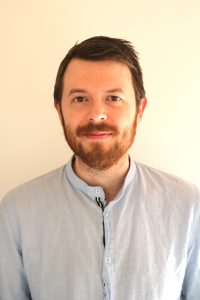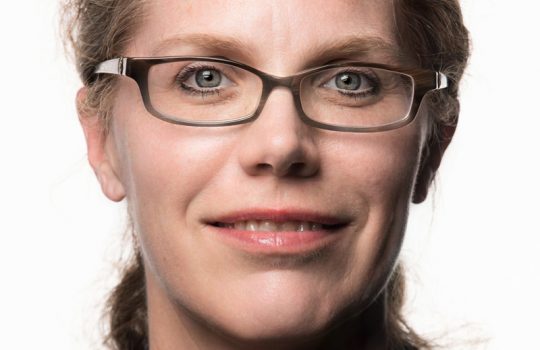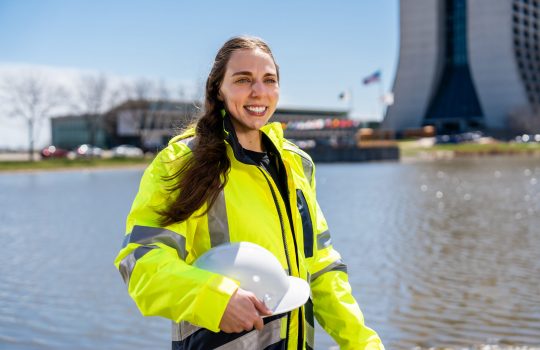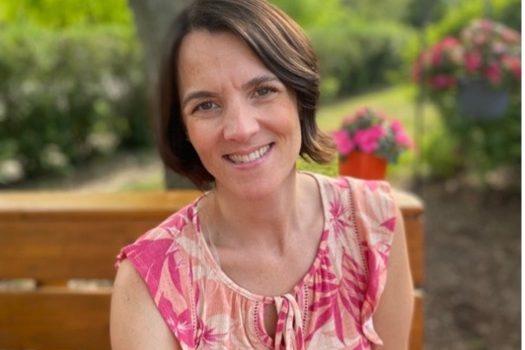How long have you been at Fermilab?
I’m still very new actually; I started my position in early July of 2021, so it’s just over a year. I’ve had a lot of colleagues at Fermilab with whom I had collaborated or interacted scientifically going back for quite a while. I was accustomed to visiting the lab, but as a formal employee, I’m still pretty new.
Can you describe what you do and what you work on at Fermilab?
I’m a staff physicist. I wear a number of different hats. I’m a theoretical physicist, and I do a lot of computation as well. The main bread and butter of what I do at Fermilab is related to the neutrino program; doing theory calculations that are relevant for neutrino nuclear cross sections and understanding aspects of those calculations in greater detail and in preparation for the DUNE program. Much of this work depends on my core efforts to understand the strong interaction—one of the four known fundamental forces in nature—with greater accuracy at both high and low energies.
Another aspect of it is computational, as I was hired in part to provide guidance to the GENIE event generator framework, which is a necessary tool that experimentalists use to make predictions for experiments and calibration and that sort of thing. A lot of what I do stems from my background in quantum chromodynamics. The idea is to try and control the neutrino nuclear scattering cross section to better accuracy and precision.
I also have some activity in the Fermi Quantum Institute. The idea there is to perform simulations of nuclear systems in service of the neutrino program. A lot of the work is still very new, so it’s very exploratory to try and identify what you can even do in principle with machines like this. There’s a lot of just trying to formulate things with simple models or simple theoretical setups. My home is in the scientific computing division, but I’m also a presence in the theory division and then in FQI; I bring together a number of different threads at the lab in that respect.
How did you first get interested in pursuing physics?
I think some part of me was always drawn to things that seem deeper. I always wanted to have a more fundamental understanding of things, to tear the wallpaper down and see what’s underneath. I searched around for quite a while, especially when I was younger. It seemed like I kept coming back to physics and trying to understand matter and energy and time and these really fundamental things. I think I was in the fifth grade was when I learned what a physicist was, and I was like, “This is what I want to do.” I really feel an enormous amount of gratitude and good fortune just to be able to do this because it’s what I’ve wanted to do for so long.
What is the most rewarding part of your job?
People have thought about these sorts of things for thousands of years, but to get a sense that you can actually do something; you don’t get that in a lot of other areas of human thought. I also find really gratifying the fact that there’s a conclusion or some sense of progress. You learn more and you grow your knowledge. Cumulatively, we’re also learning more, and I think that’s really exciting and really cool.
Is there anything you find particularly challenging about your work?
One thing that’s challenging—really with any complicated undertaking—is getting a bunch of people on the same page intellectually. Different people have different expertise, and so we all have to coordinate collectively in some way. Some people are particularly good at developing a certain type of algorithm, and you need input from theorists. Then we need our experimental colleagues to have a lot of input. Part of my job is to bring many of these different people together, but the work of collaboration, which is its own reward, is something that requires a lot of effort to nurture.
What do you like best about working at Fermilab?
I think Fermilab really makes an effort on a number of different fronts to have an inclusive culture. I do get the sense that, of the number of different places I’ve been, it really cares [about] trying to do the right thing. I really get the sense that the lab tries to prioritize making employees feel cared for or taken care of. It feels like an open and generally welcoming place.
What do you like to do for fun?
My job consists of reading a lot of physics papers, so I like to read things that aren’t physics. I definitely enjoy cooking, and more importantly, eating. I also really like traveling internationally, which has been kind of hard during COVID. Eating new food, meeting new people and hearing different languages, that all really speaks to my heart.
Fermi National Accelerator Laboratory is supported by the Office of Science of the U.S. Department of Energy. The Office of Science is the single largest supporter of basic research in the physical sciences in the United States and is working to address some of the most pressing challenges of our time. For more information, please visit science.energy.gov.




